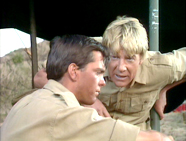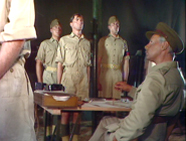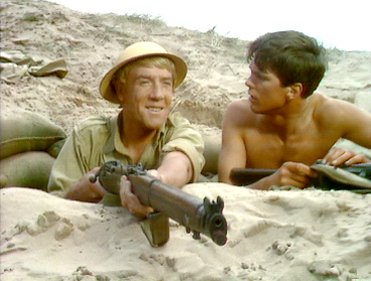A Lesson in War
by Alexander Baron
Episode Number: 16 Director: Bob Hird |
CAST
| Philip Ashton | Keith Drinkel | |
| Company Sergeant Major Basset | David Swift | |
| Stashek Zhelinovsky | Bryan Marshall | |
| Private Hills | Michael Blackham | |
| Franek | Richard Orlowski | |
| Jasiu | Stefan Gryff | |
| An Aussie | Edmund Pegge | |
| The Colonel | Clifford Rose | |
| Captain Carbury | Robert French | |
| Lieutenant Prideaux | John Hallam | |
| Private Evers | John Cording | |
| Corporal Short | Geoffrey Hinsliff | |
| A German Soldier | Tony Vogel | |
| Wakeley | Chris Sullivan | |
| Robins | Colin Sherwood |
![]()
THE WESTERN DESERT, APRIL 1941
| Transit Camp Tent | Sergeant Major Basset is instructing his troops in the proper army protocol for drawing one's pay. A truck arrives, bringing from detention an outspoken Polish private named Zhelinovsky. Basset takes an instant disliking to the new man, whose familiar name is Stashek, and sizes him up as a troublemaker. |
| Transit Camp Grounds | Corporal Philip Ashton befriends Stashek and asks him why he was in detention. A.W.O.L., he replies—desertion—but in the direction of the front, to join up with the Polish army. Because he was in England when the war started, he enlisted in the British army, but bureaucratic red tape has prevented his transfer to the Poles. Philip tells him that he is trying to re-join his battalion, after having become separated from it while away on assignment, translating for the French. Rommel has arrived in North Africa, and he has pushed the Allies back five hundred miles. Stashek says he despises the Germans and would love someday to meet a German soldier face to face. He tries to convince Philip to desert with him to the Polish Carpathian Brigade, but Philip refuses to go "over the fence." Stashek accuses Philip of being afraid and no friend of his. Philip tells Stashek that he does not need a friend—he needs a keeper. Stashek warns Philip that keeping an eye on him will be a full-time job. |
| Inside the Billet | Private Hills approaches his NCO, Corporal Ashton, for advice on how to send an allotment to his (unwed) "Mrs." and daughter. Complaining about the war and "this lousy, fly-blown dump," the private says he wishes he were in action. Stashek pours some Polish vodka for Hills and all of the other men, explaining that he possesses secret sources to provide a plentiful supply of this "nectar of freedom." He even teaches everyone an emphatic Polish toast, "Na zdrowie!" Sergeant Basset hears the shouting and investigates, only to find that many of the men seem to have been drinking in the billets. He notices an empty vodka bottle and then sees that Private Hills is inebriated. Just as he is about to deal with the drunk soldier, Stashek puts his arm around the sergeant and invites him to join the party. Basset orders two men to escort Stashek to the guard room, and Stashek winks at Philip as he is being taken away. When the sergeant marches out of the tent, Philip and the others submerse Hills's face into a fire bucket of water to sober him up. |
| The Guard Tent | Philip visits Stashek, and they secretly exchange gifts of food and tobacco. Stashek invites Philip to come with him to Cairo soon with some of the other men. |
| A Bar in Cairo | Philip and Stashek are joining in the boisterous revelry when Stashek spots two of his old friends, Franek and Jasiu. Jasiu goes to the piano and plays a Polish folk tune, to which Franek and Stashek dance. An Australian soldier starts a fight with Stashek, and Philip manages to pull Stashek from the room just before the "red caps" (military police) arrive on the scene to intervene. |
| Transit Camp Grounds | Sergeant Basset is drilling his troops in the proper way to fire from a "lying low" (prone) position. Stashek, awaiting his turn, decides to squeeze off a few rounds into the sand. When Basset confronts him, he accuses the sergeant of wasting the men's time, as they are all trained soldiers. Stashek takes it upon himself to "order" two men to take him to the guard house. |
| The HQ Tent | Philip tells the colonel that Private Zhelinovsky (Stashek) is Polish and only wants to join his own people to fight. The colonel says the army will decide that, and in the meantime his job, as commanding officer, is to keep the men occupied and well drilled. Captain Carbury explains that, in any case, rear echelons cannot be shifted, to which the colonel adds, "The man must face the music." |
| Outside the Billet | Thanks to the intervention of Captain Carbury, Stashek is back with the other men, though a medical examination (presumably with a psychiatrist) is still pending. The soldiers are engaged in small talk while preparing their kits for inspection. Sergeant Basset arrives, and the men snap to attention. Philip is told to write down the names of each soldier whose uniform and kit are unsatisfactory. When Basset finally comes to Stashek, he scatters Stashek's kit into the sand. Enraged, Stashek rushes toward the sergeant until Philip separates the two. Basset orders Stashek to the guard house, but Philip refuses to obey, claiming that the Polish soldier's kit was in perfect order. Basset tells Philip to consider himself under arrest, to be charged under Section 40. Further, the sergeant accuses Stashek of attempting to strike a warrant officer, but Philip denies the charge, suggesting that perhaps Stashek was only having a fit. Still standing in formation, Private Hills voices his agreement, and Basset orders him to be taken to the guard room, but Philip tells the men to stand fast. Philip tells Basset that the men are sick of him and other "superannuated blimps." Then Philip marches himself and Stashek to the guard house. |
| The Guard Tent | Stashek informs Philip that he holds a Doctor of Philosophy degree from Kraków University. He says many Polish officers are like Basset, putting the troops at a disadvantage in battle, such as recently against the Bolsheviks. He asks Philip why he fought with the Bolsheviks in Spain, and Philip explains that he was fighting for the republic and democracy. Stashek reveals that his father, a poor country doctor, was murdered by the "Bolshevik jackals"—hanged in his own garden because of his higher education. His mother was killed too, but his sister escaped and lived to tell about it. Stashek declares that the next war will be against communism, claiming that the Nazis are inhuman, but the Bolsheviks are barbarians. Philip cannot believe that the communists are as bad as the Nazis, and this "English complacency" enrages Stashek. Stashek accuses the English of being soft against Hitler for not coming to Finland's aid. Clearly, what is merely a civil discussion to Philip is much more than that to the impassioned Stashek. When Stashek says all enemies must be killed—the law of the jungle—Philip cannot believe his ears and calls Stashek a fascist. At this, Stashek moves ten feet away and turns his back on his former friend. He will kill Germans gladly, he assures Philip, but he will never forget that he called him a fascist. |
| The HQ Tent | At a hearing before the commanding officer, Basset tells his side of what happened during inspection. When Philip attempts to give his own account, the colonel stops him short, explaining that the only issue under consideration is his refusal to obey an order. He concludes that Philip is guilty of insubordination, adding that he is fortunate not to be charged with incitement to mutiny. The biggest point in Philip's favor, he reasons, is because Philip prevented Stashek from attacking the sergeant major. The colonel suspects that "superannuated blimps" was also intended to describe him, and Philip tacitly confirms that assumption. Philip, rules the colonel, shall be reduced from NCO to the ranks, no longer a lance corporal. |
| Inside the Billet | Private Ashton and the others are visited by Captain Carbury, who informs them that they will be returning to their own battalion. Stashek joins the men, saying there is to be no punishment for him, that "they only want to get rid of me." |
| The Desert | A Bedford QLT troop carrier transports the men to their battalion at Hellfire Pass. |
| The Command Tent | When they arrive, Lieutenant Prideaux is there to explain that they are in reserve, carrying out nighttime raids for Corporal Short's section. Prideaux takes Philip aside, cautioning him to behave because he cannot afford to lose good NCOs. |
| The Desert | That night, Philip shares a sandbagged foxhole with Stashek, and they are awakened at daybreak by the sound of a mechanised vehicle, which Stashek identifies as a Volkswagen engine. They train their rifles on its German driver, who is now on foot, but then Philip circles around to determine how many of the enemy there are. Philip returns to the foxhole bearing news that this German seems to be alone—and apparently lost. Stashek takes careful aim and shoots the German to death, much to Philip's shock, and Stashek tells him, "You don't know what it's about, do you?" |
| The Command Tent | Stashek informs Lieutenant Prideaux that Private Hills is ill, so he himself will be going on the patrol instead. Prideaux resents the cocky enlisted man but figures that Stashek could prove to be a valuable addition to the mission. The lieutenant tells his men—Stashek, Philip, and Corporal Short—that their objective will be to capture for interrogation a German prisoner from the newly arrived 15th Panzer Division. The ground near the forward position, he cautions, is very bad and dotted with land mines. |
| The Desert | Under cover of darkness, the men walk slowly through the mine fields. An enemy flare is fired overhead, but the patrol continues. Corporal Short tumbles from a small dune but is not injured in the fall. Upon rising to his feet, however, he steps on a mine and is killed instantly. Lieutenant Prideaux, standing near-by, is mortally wounded by the blast. As Stashek hides Short's body, Philip drags Prideaux to a bombed-out building, where he examines the injured officer and discovers that his body is riddled with shrapnel. Prideaux dies even before Philip can apply the field dressing to his wounds. Rather than turn back, Philip decides to press on, much to Stashek's approval. After numerous German tanks roll by, Philip and Stashek spot a lone German soldier on motorbike patrol. Stashek flags him down, speaking in German and pretending to be a lost straggler. Philip sneaks up from behind the German and wrestles him to the ground, an errant shot from the enemy rifle striking the German in his left shoulder. After dragging the German back to the building, Philip and Stashek converse with the prisoner, who understands English very well, owing to his background in international trade. Stashek grips the enemy's wound, causing him to cry out in pain, and then he proceeds to interrogate him, threatening more of the same—and worse—if he refuses to cooperate. As Philip and Stashek are arguing about ethical treatment of the prisoner, the German notices a service revolver almost within arm's reach. Philip pulls rank, ordering Stashek to discontinue the torturing, and the German thanks him for this show of compassion. The prisoner tries to ingratiate himself to Philip, protesting that he was never a Nazi and that he loves the English people. Stashek breaks up their "little tête-à-tête," saying it is time to meet the truck for the return trip. As they are consulting the map, the German edges his way toward the weapon, secures it, and shoots Stashek in the back. Reacting quickly, Philip clubs the German several times with his rifle butt. Stashek falls to the floor, and, with his dying breath, says to Philip, "Well, now you know what it's about, huh?" Philip removes Stashek's tags, re-folds the map, and leaves to meet the truck—the sole surviving member of this ill-fated patrol. |
 |  |
| Script Excerpt 1 Philip/Stashek | Script Excerpt 2 |
